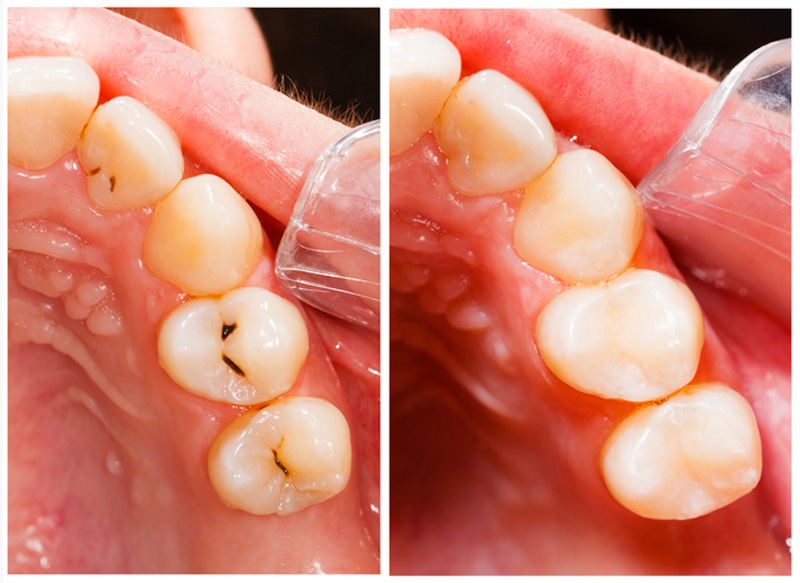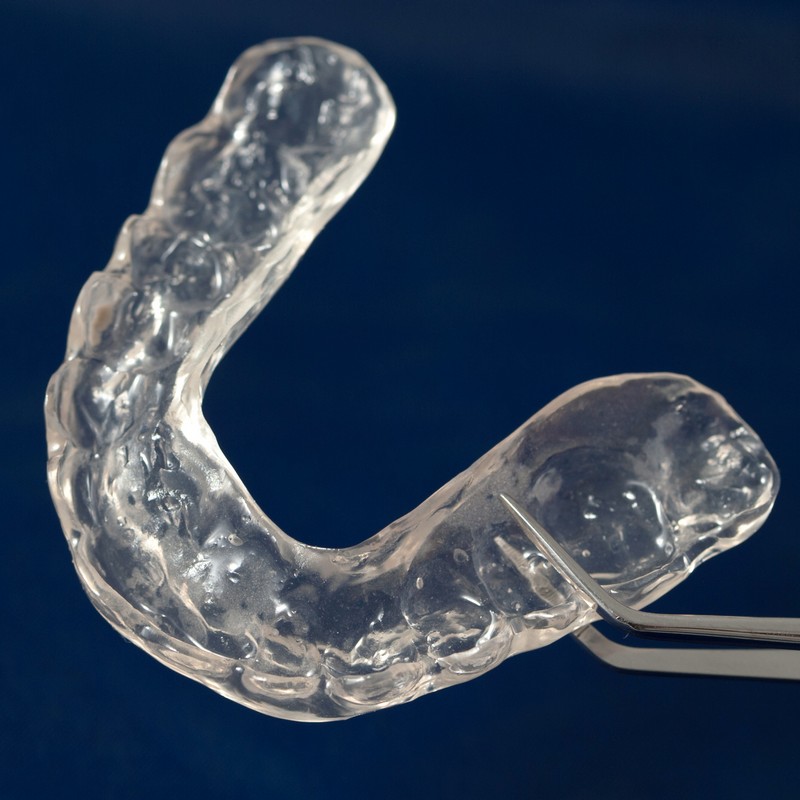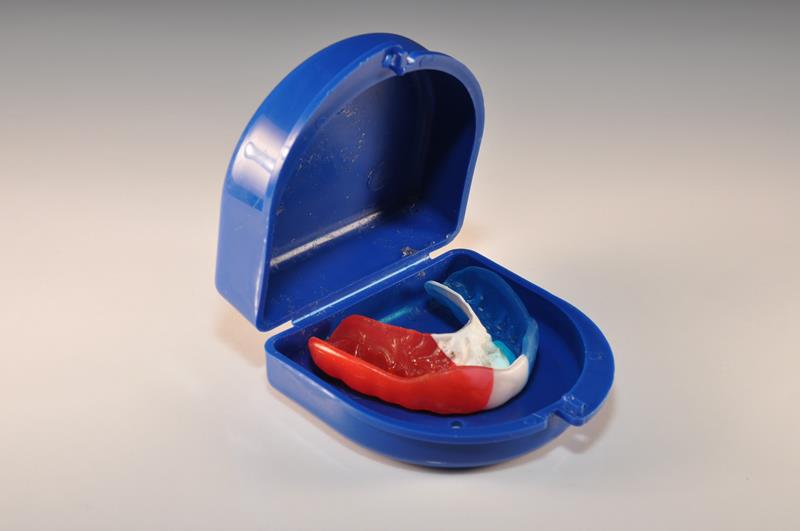
General Dentistry
Dr. Kenneth Hill and his staff believe that good oral hygiene and a healthy mouth are essential to a beautiful smile, as well as important to your overall health. The best way to achieve excellent oral hygiene is through regular cleanings and preventative dentistry, which help eliminate dental problems before they arise.
The first step in achieving optimal oral health and a great smile is dental check-ups with teeth cleaning every 6 months. During a cleaning, our hygienist will remove built-up plaque from your teeth which helps prevent gum disease. During visits Dr. Hill and his staff will perform a comprehensive evaluation of your oral health including manually examining your teeth, oral cancer screens, and X-rays to help address problems before they arise. After your xrays, Dr. Hill will discuss any potential issues with you, including treatment options. While in our office, it is all about you!
Preventative care does not begin and end in the dentist chair. In fact, healthy habits at home are extremely important to oral hygiene. Brushing and flossing regularly will help you keep your teeth, gums and surrounding tissue healthy for a lifetime. Dr. Hill and his staff believe that patient education is extremely important, and your oral health is a team effort including you. They will take the time to show you proper techniques and answer any questions you may have. Call us today to set up your check-up and cleaning!

Preventative Dentistry
It is important to brush your teeth at least twice daily to help remove plaque and food particles that get stuck to your teeth. It is recommended that you brush your teeth for two minutes (or longer), though most people rush through this time. You need to make sure that you reach every side of each tooth, including the inside and outside. To help keep your breath fresh, you should also brush your tongue. Then, you can begin flossing.

Cleanings And Exams
Having a dental practice perform a checkup and regular cleaning gives a preventive approach to dental care. These general dentistry treatments help prevent problems with your teeth, gums and jaw bones, or they catch and manage problems before they worsen. During your visit, Dr. Hill will take a picture of the current standing of your dental health and what would be needed to keep your oral hygiene in its best state.

Teeth Whitening
A beautiful, white smile can help boost your confidence from making first impressions to proudly displaying your teeth in photographs. However teeth become stained, discolored, or dull from food, drinks, tobacco, and simple aging. Drinks such as coffee, tea, and red wine will discolor teeth over time, and foods such as berries and soy sauce can lead to teeth staining. Teeth whitening is a safe, effective way to brighten your smile helping patients appear younger and more vibrant.
There are a variety of methods available to those who wish to achieve whiter teeth. There are take-home kits which allow you to whiten your teeth by a few shades in the comfort of your own home and can be effective if monitored properly. Professional whitening performed by Dr. Hill and his staff is considered the safest and most effective method, which can help whiten your teeth by several shades.
In some cases, porcelain veneers or dental bonding are more appropriate to teeth whitening. If you are considering teeth whitening, schedule a consultation with Dr. Hill where you can discuss your various treatment options and choose the one that is best for you.

Fillings
What is a Filling?
When a tooth undergoes decay, the decayed area needs to be removed to prevent it from spreading. After removing the decay a hole is left in the tooth (hence a “cavity”). That hole needs to be filled with a material to prevent decay from reoccurring. The filling also creates a good surface for normal dental functions like chewing.
The material chosen is very important because there are many advantages and disadvantages to the different materials. Our dental office uses only tooth colored composite fillings and we do not offer mercury silver fillings. For your benefit and dental education, we offer an explanation of the different materials, their advantages and disadvantages below.
What is a Silver Amalgam Filling?
Amalgam is the traditional material used in a filling. Amalgam is made out of tin, mercury, copper, silver and zinc. They are often called “Silver Fillings” or “Mercury Fillings”. Amalgam fillings do not require special tools or advanced techniques. The process of an Amalgam filling is quicker and easier which makes them cheaper and a preferred choice for some dentists.
Dental amalgam is very strong, second only to gold fillings.
The Disadvantages of Silver Amalgam Fillings
Though cost-effective, silver colored fillings are visible when a person opens their mouth wide enough to laugh or smile. This often looks unsightly and many people become more aware of their mouth and smile less. Additionally, the metal oxidizes over time and turns from a silver color to a black color. Fillings near the gum line tend to cause the gum tissue to turn black as well.
The amalgam material does not actually bond to the teeth. The dentist has to do certain tricks to create a “pocket” to contain the material or has to use pins or other mechanical devices to hold the filling in place. This means that the amount of tooth removed for the filling is greater than it should be. It also means that the filling can pop out over time.
Other concerns include sensitivity to the metal material. Metals are good conductors of heat and cold which causes sensitivity. Also, temperature changes in the mouth cause the metal fillings to expand and contract. Over time this can damage the tooth.
Most concerning, the amalgam fillings contain mercury. Mercury exposure is extremely unhealthy. It should be noted no long term studies have yielded definitive results as to the potential dangers of mercury fillings. However, most health advocates would not recommend the use of mercury in the human body and are concerned about mercury vapor release over time.
What are Tooth Colored Fillings (Composites)?
Tooth colored fillings were introduced in the mid 1960’s. Overtime, the materials used have undergone continual improvements. This has resulted in materials that are harder, more durable, look nicer and are easier to work with.
Today, composite fillings are made from a resin (containing specific plastic and glass particles). It is made to match your natural tooth color. Initially, the material is soft and easy to bend and shape. The resin can be used for fillings but can also be used to repair chipped teeth. This makes it a great choice for repairing chipped front teeth without the repair being visible. The resin material is then exposed to a special blue light which cures and hardens the material. This chemically bonds the material in place. The result is a natural appearance. It is also durable and strong since it is actually bonded to the tooth. So in the case of a chipped front tooth repair, a person can still bite into hard, crunchy foods without damage.
This same process can be used to change the size, color, and even the shape of a tooth. For instance, if you needed to close a gap better or make your teeth appear more straight and even.
What are the Advantages of Composite, Tooth Colored Fillings?
There are no health risks associated with the use of composite fillings. The resin is made from inert, non-toxic ingredients.
Composite fillings look natural. The color of the material is adjusted to blend naturally with your existing teeth.
Composite fillings are strong. Whereas the material isn’t quite as strong as metal, the chemical bonding and hardened resin material restores 85% – 95% of the original tooth strength. If damaged, composite fillings can be repaired.
Composite fillings are more comfortable. The materials used harden in seconds. Metal materials can sometimes takes days to harden. The non-metal material creates less sensitivity and discomfort for the patient.
What are the Disadvantages to Composite Fillings?
The use of composite materials requires more skill on the part of the dentist. This makes the experience and qualifications of your dentist even more important. Dr. Hill is highly experienced and adept at cosmetic dental procedures.
Though the material is stain resistant, frequent or prolonged exposure to dark liquids can potentially stain the material over time. But it can also stain surrounding teeth as well and all can be repaired or whitened. Prolonged alcohol usage can potentially degrade the material used.
Composite fillings are not as strong as metal fillings, but they are still very strong.
Composite Fillings Alternatives
There are alternatives to composite fillings. The most esthetic and long lasting alternative would be a laboratory created porcelain inlay or composite inlay. Inlays last longer than fillings and are more stain and alcohol resistant. Inlays are much more expensive because they require two or more visits and they are made in a dental laboratory. Inlays may be the best option in certain situations (the size of the area, the location, the required dental function). Inlays are a great choice if the budget allows for it and our dental office can provide inlays. Dr. Hill can consult with you on your best options and which one is best for your situation.
Replacing Amalgam Fillings with Composites
Many people are not happy with the amalgam fillings they received when they were children. Or perhaps the filling has increased in discomfort or sensitivity. Many patients are replacing their existing amalgam fillings with tooth colored composite fillings.
Do you have a “metal mouth”? Do you smile less because you have existing silver / mercury amalgam fillings? We can replace your existing fillings with natural tooth colored composite fillings and give you a reason to smile again.
The Best Choice for Tooth Fillings?
Our office believes those teeth colored composite fillings are a stronger and healthier choice for our patients. The tooth colored material is metal free and made from plastic resin. They are very durable, tissue compatible, kind to the opposing teeth, and stain resistant. Tooth colored fillings allow us to preserve the greatest amount of natural tooth enamel, and perhaps more importantly, they are made from inert non-toxic ingredients.

Root Canals
In the past, a badly infected or damaged tooth was removed. Dentistry has evolved and removing teeth can cause potential side effects. The goal of modern dentistry is to save as much of the original tooth structure as possible and extract the tooth only when necessary. A root canal is a treatment aimed at saving a badly damaged tooth. The damaged or infected area of the tooth is removed (the pulp) and then cleaned, filled back up, and finally sealed. The term “root canal” comes from cleaning of the canals inside the tooth’s root.
Root canals are tiny passageways that branch off inside your teeth and contain nervous tissue. As teeth age, the pulp, containing blood vessels, nerves, and other tissues, might become inflamed or infected. As the infection or inflammation spreads, it can affect the root canals which contain nerves and blood vessels. This can cause extreme pain and sensitivity. Even worse, a spreading infection can eventually progress to an abscess. If left untreated, an abscess can potentially cause life threatening conditions.
To prevent the spread of infection, abscess formation and pain, Root Canal Therapy is performed. It involves removing the infected tissue to prevent further damage to surrounding teeth and tissue. Once an adult tooth has emerged from the gums, the nerves in the root canals serve no purpose except to sense cold, heat, and other stimuli. Removing the nerves (pulp) and infected tissue is a standard part of root canal therapy.
After removing the infected tissue, the canals are reshaped and filled with an elastic material, then later the healthy portion of the tooth is restored. Often times a permanent seal is made using a crown.
Tooth extraction was formerly the only way to treat a diseased tooth and root canals. Now, root canal therapy allows the damaged tooth to be saved and then restored. It is important to catch infections as quickly as possible, so make sure to schedule an appointment whenever you experience tooth pain.
Symptoms of a Dental Abscess or Infection:
- Swelling of your jaw, cheeks, gums, or in your neck glands.
- Serious teeth pain when eating or when you put pressure on the area
- Inflamed, swollen, or infected gum tissue
- Constant toothache or a dull, constant throb in a tooth.
- Odd, bitter taste in the mouth.
- Sensitivity to hot or cold that lingers after the hot or cold stimuli have been removed
- Fever
- Bad Breath
- A small “pimple” in the gingival tissue (the gums near the area of teeth pain)
- Darkening of the tooth
Common Risk Factors for Root Canal Infection:
- Cracked or chipped tooth
- Deep cavity or severe tooth decay
- Trauma to the tooth
- Recent dental procedures or repeated dental trauma to the tooth.
- Large Fillings
Do I Need a Root Canal?
Only a trained dentist can answer this question. It is possible that your issues could be caused by something simpler and less invasive to treat.
Problems Removing a Tooth
When a tooth is removed and not replaced, the teeth around it may shift. This can make biting and chewing difficult and may make it harder to clean your teeth. Areas that are not cleaned well are more likely to get gum disease.
Root canal treatment can prevent these problems by saving your natural tooth. Also, root canal treatment is usually less expensive than a replacement tooth.
Saving the natural tooth with root canal treatment has many advantages:
- Efficient chewing
- Normal biting force and sensation
- Natural appearance
- Protects other teeth from excessive wear or strain

Extractions
An extraction is performed to remove a tooth, whether because of disease, crowding, or damage. When extractions are required, the area around the tooth will be numbed and your dentist will remove the tooth. A small amount of bleeding is normal, as your mouth will replace the removed tooth root by forming a blood clot in the area.

Oral Cancer Screenings
Dr. Hill understands that early detection of cancer is a key component to treatment and recovery, which is why he incorporates oral cancer screenings into each appointment.
During your initial consultation with Dr. Hill, he will be thoroughly investigating your mouth for any signs of oral cancer. During the examination the doctor will look inside your mouth and be checking for mouth sores or white and red patches. He will feel around the mouth tissue to see whether there is any skin abnormality or odd lumps. If our doctor finds any unusual sore which can be of concern then it would be necessary to make further examinations to determine the cause. The most effective single way to conclude whether you are suffering from oral cancer is to take a few abnormal cells and get them tested for cancer through a process called biopsy.
We perform a cancer screening on every patient that visits us. We feel it is another way that we go above and beyond for each new patient that we see. This small extra step could save the life of any unknowing patient that may have been at risk for this deadly disease.

Sealants
When we apply a dental sealant, we paint a plastic coating on top of your teeth. This makes your teeth smooth getting rid of the rough edges, depressions, and grooves that are commonly found on teeth. It is essentially a protective coating against tooth decay and cavities.
The most common place to paint sealants is on back teeth since they are often irregular. They can also be very hard to reach, even if you brush your teeth regularly. We use it more on children though we do perform sealants on adults too!

Night Guards
It can be beneficial to use a guard, or covering, to protect your teeth from grinding while sleeping. Similar to how a mouthguard protects teeth during sports, this layer prevents damage to the teeth that can occur naturally.
There are a wide variety of different types of mouthguards, ranging from pre-formed pieces to ones that are custom fitted to your teeth and jaws. Some of these can even be formed at home through a boil-and-bite process.

Sports Mouth Guards
As dentists, we are determined to make sure your mouth and teeth are well protected during sports activities, no matter what your passion is. To do this, we offer many different types of mouth guards, depending on the types of activities in which you are involved. There are some mouth guards for low-impact sports and others for high-impact sports.
Mouth guards not only protect your mouth and teeth, but also have other purposes. Mouth guards will help decrease the impact if you get hit in the jaw. They have also been shown to increase an athlete’s performance.
Many people clench their teeth while playing, which can give them temporomandibular joint syndrome (TMJ). Clenching your jaw the whole time can be quite exhausting. Mouth guards help to relax your jaw, allowing you to completely focus on the game!

TMJ Treatment
The tempromandibular joint or jaw joint is a complex joint that can often be affected by a number of factors. The interrelationship between your teeth, jaw joints, head and neck muscles, and head posture often dictates that a problem in one of these area can affect others. If you suffer from any of the following, an evaluation may be needed.
-
Headaches
-
Jaw joint pain
-
Jaw joint noise or clicking
-
Ear congestion
-
Dizziness
-
Ringing in ears
-
Loose teeth
-
Clenching or grinding
-
Sensitive teeth
-
Chewing difficulties
-
Hot & cold sensitivity of teeth

Wisdom Teeth Extractions
Wisdom teeth are the last set of molars. Most people start to get their wisdom teeth when they are teenagers, though some teeth don’t come in until you are in your early twenties.
Wisdom teeth have a purpose. They are another set of molars, but more often than not they cause more problems than they are worth. Wisdom teeth can come in misaligned, facing any direction. They can even try to come in horizontally, growing into your other teeth. This can damage your nerves and even your jawbone.
Since wisdom teeth are often harmful, most dentists recommend their removal. The surgery goes much better if you get the teeth removed before any signs of problem. The recovery is easier also. Surgery and recovery are also easier when you are younger.
